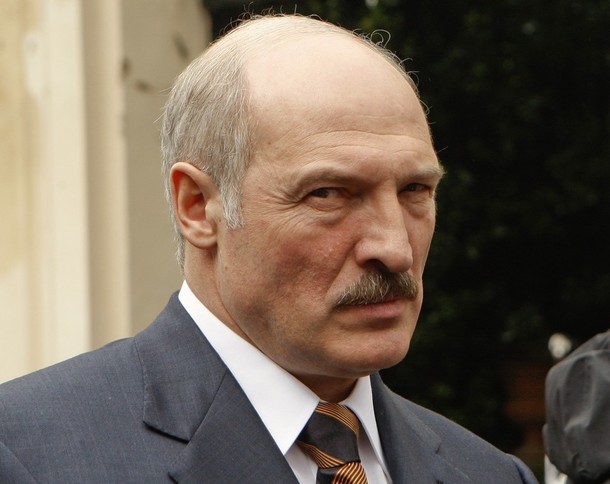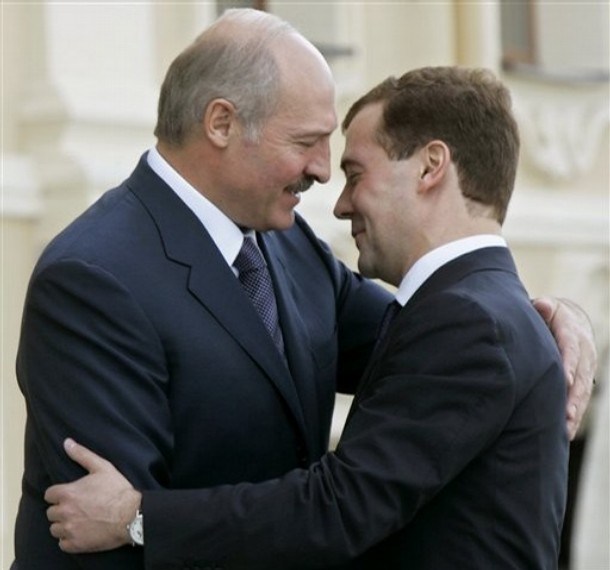<Back to Index>
- Chemist Theodor Svedberg, 1884
- Painter Theo van Doesburg, 1883
- Dictator of Belarus Alexander Grigoryevich Lukashenko, 1954
PAGE SPONSOR
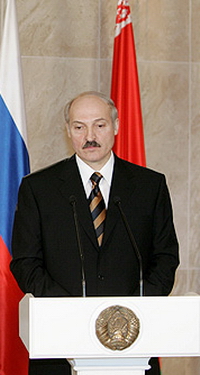
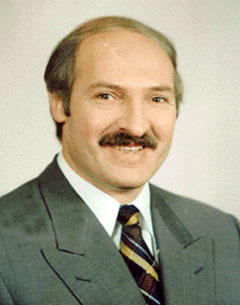
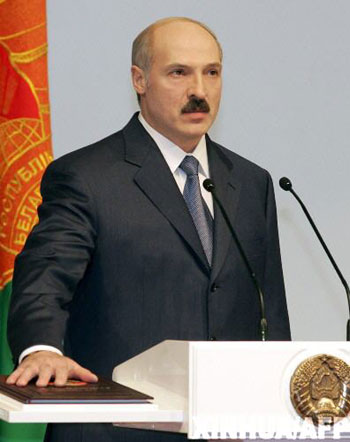
Alexander Grigoryevich Lukashenko (Belarusian: Аляксандр Рыгоравіч Лукашэнка; Romanized: Alyaksandr Ryhoravich Lukashenka; Russian: Александр Григорьевич Лукашенко; Romanized: Aleksandr Grigoryevich Lukashenko; born 30 or 31 August 1954) has been serving as the President of Belarus since 20 July 1994. Before his career as a politician, Lukashenko worked as director of a state owned agricultural farm. Under Lukashenko's rule, Belarus has emerged to be viewed as a state whose conduct is out of line with international law and whose regime is considered to grossly violate human rights. Belarus has never held a poll seen as fair by international monitors since Lukashenko began his presidency. Belarus has been called “the last true remaining dictatorship in the heart of Europe” by the former U.S. Secretary of State Condoleezza Rice. He and other Belarusian officials are also subject of the sanctions imposed by the European Union for egregious human rights violations.
Lukashenko was born on 30 or 31 August 1954 in the settlement of Kopys in the Vitebsk voblast of the Belorussian Soviet Socialist Republic. Trokhym Lukashenko, grandfather of Lukashenko – was born in the Sumy Oblast of Ukraine. Lukashenko grew up without a father in his childhood, leading him to be taunted by his schoolmates for having an unmarried mother. He graduated from the Mogilev Pedagogical Institute in 1975 and the Belarussian Agricultural Academy in 1985. He served in the Border Guard (frontier troops) from 1975 to 1977 and in the Soviet Army from 1980 to 1982. Lukashenko led a Komsomol chapter in Mogilev from 1977 to 1978. While in the Soviet Army, Lukashenko was an officer of the 120th Motorised Rifle "Guard" Division, which was based in Minsk. After leaving the military he became the deputy chairman of a collective farm in 1982 and in 1985 he was promoted to the post of director of the Gorodets state farm and construction materials plant in the Shklovdistrict.
In 1990, Lukashenko was elected as a Deputy in the Supreme Council of the Republic of Belarus. He was the only deputy of the Belarusian parliament who voted against ratification of the December 1991 agreement that dissolved the Soviet Union and set up the Commonwealth of Independent States in its place.
Having acquired a reputation as an eloquent opponent of corruption, Lukashenko was elected in 1993 to serve as the chairman of the anti - corruption committee of the Belarusian parliament. In late 1993 he accused 70 senior government officials, including Stanislav Shushkevich, of corruption including stealing state funds for personal purposes. The Speaker of Parliament, Shushkevich lost a vote of no-confidence and resigned. Some believe that the vague nature of the charges indicates they were merely a pretext for removing Shushkevich, who had become increasingly unpopular among the conservative parliamentary majority.
A new Belarusian constitution enacted in early 1994 paved the way for the first democratic presidential elections in July. Six candidates stood, including Lukashenko, who campaigned as an independent on a populist platform of "defeat[ing] the mafia." Shushkevich and Vyacheslav Kebich also ran, with the latter regarded as the clear favourite. Lukashenko won 45.1% of the vote while Kebich received 17.4%, Zyanon Paznyak received 12.9% and Shushkevich received 9.9%. Lukashenko won the second round of the election on 10 July with 80.1% of the vote. Shortly after his election to the presidency in Belarus, he addressed the State Duma of the Russian Federation in Moscow proposing a new Union of Slavic states, which would culminate in the creation of the Union State in 1999.
In May 1995, one of the first votes under Lukashenko occurred. Not only were the national symbols of the country changed, but Lukashenko was also given the ability to disband the Supreme Soviet by decree. In the summer of 1996, 70 deputies of the 199 member Belarusian parliament signed a petition to impeach Lukashenko on charges of violating the Constitution. Shortly after that a referendum was held on 24 November 1996 in which four questions were offered by Lukashenko and three offered by a group of Parliament members. The measures passed, but faced international and internal condemnation. On 25 November, it was announced that 70.5% of voters, on an 84% turnout, had approved an amended constitution that greatly increased Lukashenko's power. The United States and the European Union, however, refused to accept the legitimacy of the referendum. By most accounts, the new constitution turned his presidency into a legal dictatorship.
After the referendum, Lukashenko convened a new parliamentary assembly from those members of the parliament who were loyal to him. After 12 deputies withdrew their signature from the impeachment petition, only about 40 deputies of the old parliament were left, but they had no place to convene, since the administration closed the parliament building "for remodeling". Nevertheless, for some time, the EU and Council of Europe considered these remnants of the old parliament as the legitimate assembly. At the start of 1998, the Central Bank of Russia suspended trading in the Belarusian ruble, which led to a collapse in the value of the currency. Lukashenko responded by taking control of the National Bank of the Republic of Belarus, sacking the entire bank leadership and blaming the West for the free fall of the currency.
Lukashenko blamed foreign governments for conspiring against him and, in April 1998, he expelled ambassadors from the Drazdy complex near Minsk, offering them another building. The Drazdy conflict caused an international outcry and resulted in a travel ban on Lukashenko from the European Union and the United States. Although the ambassadors eventually returned after the controversy died down, Lukashenko stepped up his rhetorical attacks against the West. He claimed that Western governments were trying to undermine Belarus at all levels, even sports, during the 1998 Winter Olympics in Nagano, Japan.
Upon the outbreak of the Kosovo War in 1999, Lukashenko suggested to Yugoslav President Slobodan Milosevic that Yugoslavia join the Union of Russia and Belarus. Following the Iraq war of 2003, the United States intelligence agencies issued a report that announced aides of Saddam Hussein managed to acquire Belarusian passports while in Syria. The same report mentioned that it was unlikely that Belarus would offer a safe haven for Saddam and his two sons. These policies led Western governments to take a tougher position against Lukashenko. The United States was particularly angered by Belarus's arms trade with Iran and Iraq, and American political leaders increasingly began to refer to Belarus as "Europe's last dictatorship". The European Union was concerned for the security of its gas supplies from Russia, which are piped through Belarus, and took an active interest in the country's affairs. As of 2004, the EU and Belarus share a border over 1000 kilometers in length with the accession of Poland, Latvia and Lithuania.
Elections were held on 9 September 2001 with Vladimir Goncharik and Sergei Gaidukevich as his opponents. During the campaign, Lukashenko promised to raise the standards of farming, social benefits and increase industrial output of Belarus. Lukashenko won in the first round with 75.65% of the vote. The Organisation for Security and Cooperation in Europe, said the process "failed to meet international standards", despite not having observed the election, and in spite of the statement by Gerard Stoudmann of the OIDHR (Office for Democratic Institutions and Human Rights) of the OSCE that there was "no evidence of manipulation or fraud". Russia, by contrast, publicly welcomed Lukashenko's re-election. Then Russian President Vladimir Putin phoned Lukashenko and offered a message of congratulations and cooperation. Jane's Intelligence surmised that the price of Russian support for Lukashenko ahead of the presidential elections was the surrender of Minsk's control over its section of the Yamal - Europe gas pipeline. In 2004, a referendum was passed that eliminated presidential term limits, allowing Lukashenko to stand again for office in 2006. Economically, Belarus grew under Lukashenko, but much of this growth was due to Russian oil which was imported at below market prices and then refined before being sold on to Europe.
After Lukashenko confirmed he was running for re-election in 2005, opposition groups began to seek a single candidate. On 16 October 2005, on the Day of Solidarity With Belarus, the political groups Zubr and Third Way Belarus encouraged all of the opposition parties to rally behind one candidate to oppose Lukashenko in the 2006 election. Their chosen candidate was Alexander Milinkevich, who was running against Lukashenko and other candidates. Lukashenko reacted by saying that anyone going to opposition protests would have their necks wrung "as one might a duck". The election was predicted at the time by the UK Shadow Foreign Minister William Hague with an opinion that "Mr. Lukashenko orchestrated illegitimate and undemocratic parliamentary elections to extend his power and control over the people". On 19 March 2006 exit polls showed Lukashenko winning a third term in a landslide, amid opposition claims of vote rigging and fear of violence. The EcooM organisation gave Lukashenko 84.2% of the vote and Milinkevich just 2%, while the Belarusian Republican Youth Union, gave Lukashenko 84.2% and Milinkevich 3.1%. The Gallup Organisation has noted that EcooM and the Belarusian Republican Youth Union are government controlled and both released their exit poll results before noon on election day, although voting stations closed at 8 P.M.
Belarus authorities vowed to crush unrest in the event of large scale protests following the election (such as those that marked the Orange Revolution in Ukraine). Despite that, the crowd of demonstrators rallying after the election was the biggest the opposition had mustered in years, with nightly protests and demonstrations in Minsk. The turnout at the biggest protest on election night was about 10,000 according to AP reporters' estimates. Election observers from the Russia led Commonwealth of Independent States (CIS) and the UN ad hoc organisation Organisation for Security and Cooperation in Europe (OSCE) differed on the Belarus vote. The OSCE declared on 20 March 2006 that the "presidential election failed to meet OSCE commitments for democratic elections." Lukashenko "permitted State authority to be used in a manner which did not allow citizens to freely and fairly express their will at the ballot box... a pattern of intimidation and the suppression of independent voices... was evident throughout the campaign." The heads of all 25 European Union countries declared that the election was "fundamentally flawed", in contrast, the Russian Minister of Foreign Affairs declared, "Long before the elections, the OSCE's Office for Democratic Institutions and Human Rights had declared that they [the elections] would be illegitimate and it was pretty biased in its commentaries on their progress and results, thus playing an instigating role."
Lukashenko later claimed that he had rigged the election results against himself to obtain a majority more typical of western countries. Although the results showed to him gave him 93.5% of the vote, he directed the government to announce a result of 86%. He noted that, despite promises to the contrary, even this had not satisfied his foreign critics. Some Russian nationalists, such as Dmitry Rogozin and the Movement Against Illegal Immigration, have stated that they would like to see Lukashenko become President of Russia in 2008. Lukashenko spoke and said he will not run for the Russian presidency; if his health is still good, he might run for reelection in 2011.
In September 2008, parliamentary elections were held. Lukashenko had allowed some opposition candidates to stand, though in the official results, opposition members failed to get a seat out of the available 110. The election was seen as "flawed", and opposition members and supporters demonstrated. According to the Nizhny Novgorod based CIS election observation mission, whose findings are often dismissed by the West, the elections in Belarus conformed to international standards. President Lukashenko later commented that the opposition in Belarus is financed by foreign countries and is not needed.
In April 2009, he held talks with Pope Benedict XVI in the Vatican, marking his first visit to Western Europe after a travel ban on him a decade earlier.
Lukashenko was one of ten candidates registered for the presidential election held in Belarus on 19 December 2010. Though originally envisaged for 2011 an earlier date was approved 'to ensure the maximum participation of citizens in the electoral campaign and to set most convenient time for the voters'. The run-up to the campaign was marked by a series of Russian media attacks upon the incumbent Alexander Lukashenko. The Central Election Committee said that all nine opposition figures were likely to get less than half the vote total incumbent Lukashenko would get. Though opposition figures alleged intimidation and "dirty tricks" were being played, the election was seen as comparatively open as a result of desire to improve relations with both Europe at-large and the United States.
On election day, two presidential candidates were seriously beaten by police in different opposition rallies. One opposition candidate and poet Uladzimir Niaklajeu (Vladimir Neklyaev), sustained a head injury during this beating and was abducted from intensive care by the Belarusian authorities. On the night of the election opposition protesters chanting "Out!," "Long live Belarus!" and other similar slogans attempted to storm the building of the government of Belarus, smashing windows and doors before riot police were able to push them back. The number of protesters was reported by major news media as being around or above 10,000 people. Hundreds of people who protested against the election result have been arrested, including at least seven presidential candidates. The CEC said that Lukashenko won 79.65% of the vote (5,130,557 total votes he gained) with 90.65% of the electorate voting. The OSCE categorized the elections as "flawed" while the CIS mission observers praised them as "free and transparent". Several European foreign ministers also commented on the election results and the protests surrounding the results as an "unfortunate step backwards in the development of democratic governance and respect for human rights in Belarus." However, the OSCE noted that some improvements were made in the run-up to the election, including the candidates use of television debates and the ability to deliver their messages unhindered.
Lukashenko's inauguration ceremony of 22 January 2011 was boycotted by European Union ambassadors, while fellow CIS countries did send officials not higher than ambassadors. During this ceremony Lukashenko defended the legitimacy of his re-election and vowed that Belarus would never have its own version of the 2004 Ukrainian Orange Revolution and Georgia's 2003 Rose Revolution. Effective January 31, 2011, the European Union renewed a travel ban, prohibiting Lukashenko and 156 of his associates from traveling to EU member countries, as a result of violent crackdowns of opposition supporters by Lukashenko's government forces following the election.
Lukashenko promotes himself as a "man of the people." Due to his style of rule, he is often informally referred to as бацька (bats'ka, "daddy"). He was elected chairman of the Belarusian Olympic Committee in 1997. During a televised address to the nation on 7 September 2004 Lukashenko announced plans for a referendum on whether to eliminate presidential term limits. This was held on 17 October 2004, the same day as parliamentary elections, and, according to official results, was approved by 79.42% of voters. Previously, Lukashenko had been limited to two terms and thus would have been constitutionally required to step down after the presidential elections in 2006. Opposition groups, the OSCE, the European Union, and the United States State Department have stated that the vote "fell significantly short of international standards." An example of the failure, cited by the OSCE, was the pre marking of ballots.
At the outset, Lukashenko wanted to rebuild Belarus when he took office. The economy was in a free fall, due to declining industry and lack of demand for Belarusian goods. Lukashenko kept many industries under the control of the government and privatization was slowed down. Since 2001, Lukashenko wanted to improve the social welfare of his citizens and to make Belarus "powerful and prosperous". In response to a question about Belarus's domestic policies, President Hugo Chávez of Venezuela said "We see here a model social state like the one we are beginning to create."
Some critics of Lukashenko use the term Lukashism to refer to the political and economic system Lukashenko has implemented in Belarus. The term is also used more broadly to refer to an authoritarian political ideology based on a cult of his personality and nostalgia for Soviet times among certain groups in Belarus. It is not known where the term was first used, though the earliest documented use was in 1998. The use was in the context of opening a museum to memorialize victims of Communism with a wing dedicated to Lukashism. The term has been used mostly by groups who oppose Lukashenko, such as Zubr.
Lukashenko continues to face domestic opposition from a coalition of opposition groups supported by the United States and Europe. The United States Congress has sought to aid the opposition groups by passing the Belarus Democracy Act of 2004 to introduce sanctions against Lukashenko's government and provide financial and other support to the opposition.
Those who support Lukashenko claim that his rule has spared Belarus the turmoil that has beset many other Soviet countries.
Lukashenko himself commented about the criticism on him by saying: "I've been hearing these accusations for over 10 years and we got used to it." Before the polling he said: "We are not going to answer them. I want to come from the premise that the elections in Belarus are held for ourselves. I am sure that it is the Belarus people who are the masters in our state." He warned that anyone joining an opposition protest would be treated as a "terrorist", adding: "We will wring their necks, as one might a duck".
Lukashenko’s relationship with the EU has been strained, in part by choice and in part by his policies towards domestic opponents. Lukashenko’s repression of opponents have earned him the moniker ‘Europe’s last dictator’ and resulted in the EU imposing visa sanctions on him and a range of Belarusian officials. However, in a shift of policy in October 2008, the EU decided temporarily to lift visa sanctions, mainly to help persuade Belarus not to recognize the independence of Georgian breakaway regions South Ossetia and Abkhazia, which had been recognized two months previous. These were renewed six months later (in 2009) and are due to expire at the end of 2009. On 16 September 2009, Lukashenko entered the EU for the second time since the temporary suspension of sanctions, to visit a Belarusian trade fair in Vilnius, Lithuania. The date coincided with the tenth anniversary of the disappearance and presumed murder of the leader of the Belarusian opposition, Viktar Hanchar (Viktor Gonchar, using the Russian spelling).
Since the EU adopted this policy of ‘change through engagement’, it has supported the provision of International Monetary Fund (IMF) loans to help stabilize the Belarusian economy.
Supporters of the policy of ‘change through engagement’ put forward a range of arguments. Firstly, the EU’s old policy of isolating Belarus had failed to produce results. Secondly, engagement offers some prospect of change, though no assurance of change. Thirdly, it provides opportunities to engage in a dialogue in private and to press in public for change. Fourthly, engagement may influence people in Lukashenko’s entourage, by exposing them to the European system and by showing that ‘European values’ are real, not merely a concept or a term to disguise a political agenda.
Recently, Lukashenko's relationship with Russia, once his powerful ally and vocal supporter, significantly deteriorated. The run-up to the Belarusian presidential election, 2010 was marked by a series of Russian media attacks upon the incumbent Alexander Lukashenko. State controlled NTV television broadcast throughout July a multi-part documentary entitled 'The Godfather' highlighting the suspicious disappearance of a number of opposition leaders during the late 1990s, as well as highlighting a statement Lukashenko had made seemingly praising Adolf Hitler. Lukashenko referred to the media attack as 'dirty propaganda'.
Lukashenko has been noted for making controversial statements. He has been accused of making a remark in 1995 which praised Adolf Hitler: "The history of Germany is a copy of the history of Belarus. Germany was raised from ruins thanks to firm authority and not everything connected with that well known figure Hitler was bad. German order evolved over the centuries and attained its peak under Hitler." However, this allegation was originally made by the Russian television channel NTV, on the basis of an interview which Lukashenko gave to the German newspaper "Handelsblatt", in which Hitler was not even mentioned. The original interviewer, Dr. Markus Zeiner, said "a tape of the interview had been quoted out of context and with the sequence of comments altered by the Russian media."
In October 2007 Lukashenko was accused of making blatant anti-Semitic and anti-Israel comments. Addressing the "miserable state of the city of Babruysk" on a live broadcast on state radio he stated: "This is a Jewish city, and the Jews are not concerned for the place they live in. They have turned Babruysk into a pigsty. Look at Israel — I was there and saw it myself ... I call on Jews who have money to come back to Babruysk." Members of the United States House of Representatives sent a letter to the Belarusian ambassador to the United States, Mikhail Khvostov, addressing Lukashenko's comments with a strong request to retract them. The comments also caused a reaction from Israel. Consequently, Pavel Yakubovich, editor of Belarus Today, was sent to Israel, and in a meeting with the Israel Foreign Ministry said that Lukashenko’s comments were "a mistake that was said jokingly, and does not represent his positions regarding the Jewish people" and that he was "anything but anti-Semitic," and "insulted by the mere accusation." Belarus Ambassador to Israel, Igor Leshchenya, stated that the president had a "kind attitude toward the Jewish people." Sergei Rychenko, the press secretary at the Belarus Embassy in Tel Aviv, said parts of Lukashenko's comments were mistranslated. In fact, two Belarus newspapers — Nasha Niva (Our Wheatfield) and Narodnaia Volia (People's Will) — were shut down in 2006, after ignoring several warnings, for publishing allegedly anti-Semitic and racist articles.
Lukashenko married
Galina Rodionovna in 1975. They live separately and have two adult sons Victor and Dmitry. Lukashenko
also has an extramarital son — Nikolai, born in 2004 — whose mother is most
probably Irina Abelskaya, the president's personal doctor.
